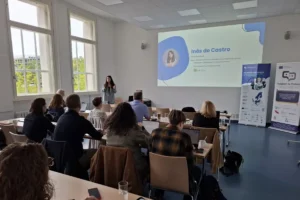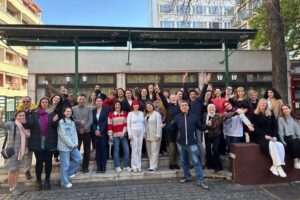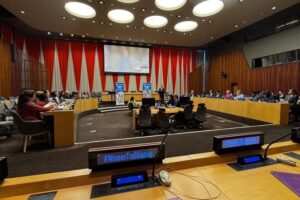Inês de Castro and Sofia Almeida from IPS were speakers at a national event on reactive aggression and training strategies using virtual reality (VR), which brought together a diverse group of professionals from the justice sector. The event was part of the activity programme of HUB of Justice, the Competence Center for Innovation and Digital Transformation in the Portuguese Justice sector.
The HUB of Justice serves both as a physical space and as a conceptual hub designed to drive innovation, modernisation, and digitalisation within the justice sector in Portugal, fostering collaboration among justice institutions, academia, businesses, and civil society.
On November 6, the HUB of Justice hosted a session about reactivity in the prison context, as part of the “Conversas Sobre…” initiative. Inês de Castro, Head of Unit for Risk Prevention & Criminogenic Intervention at IPS, and Sofia Almeida, consultant and researcher at the IPS, spoke about reactive aggression and training strategies using virtual reality (VR).

The event brought together a diverse group of professionals in the justice field, including judges, prosecutors, representatives from prison administrations, vigilance services, forensic experts, among others. A total of 49 participants joined online, contributing to an engaging and multidisciplinary discussion.
The session explored several themes, including the distinction between violence and aggression, a focused discussion on aggression and its impact on criminal behaviour, and its implications within prison settings. In addition, preventive strategies were examined, along with the potential of VR as an innovative intervention tool.
During the session, IPS’s initiatives in these areas were also highlighted, demonstrating how they have supported behaviour change, improved decision-making, and helped staff manage complex situations safely. Overall, these initiatives have contributed to reducing reactive aggression in prison settings, providing training and tools for radicalisation assessment, improving coping skills for individuals on probation with substance use challenges, offering vocational and educational programmes to develop work and life skills, and applying techniques to boost engagement in training programmes.


Related news

Shaping the future of rehabilitation with immersive tools and smart systems at ICPA 2025
Read More »






